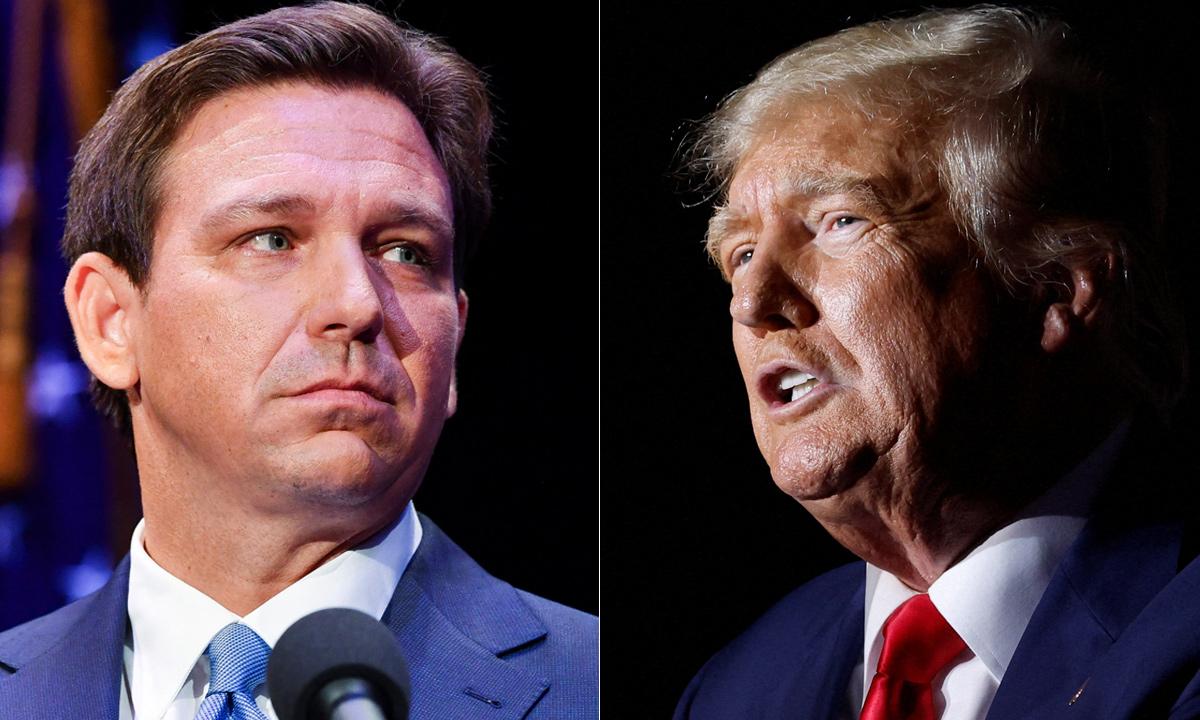


A consistent theme in early polling of the 2024 Republican primaries is that Ron DeSantis beats Donald Trump if the race comes down to a head-to-head, two-man binary choice. A new poll from Echelon Insights surveying Michigan Republican primary voters tells us that again: If offered only those two choices, 47 percent would choose DeSantis, 42 percent would choose Trump, and 11 percent are not sure.
There are a couple of new and interesting things here. First, this is Michigan, the ultimate Rust Belt state. Among all the states Trump won in the 2016 primaries and flipped that November, the one that represents the best case for Trump as the only Republican who could win there was Michigan. A national Republican had not won the state since 1988; Mitt Romney, who grew up in Michigan and whose father was the state’s governor, lost it by 9.5 points. In the 2016 primary, Trump won it by eleven points, getting 36.5 percent of the vote to 25 percent for Ted Cruz, 24 percent for John Kasich, and 9 percent for Marco Rubio. Then again, Trump won it in 2016 with 47.3 percent of the vote mainly because Gary Johnson and Jill Stein held Hillary Clinton to 47 percent; he owed a lot to the division of the opposition. Trump grew his share in 2020 to 47.7 percent but lost it to Biden, who cleared 50 percent.
Since Trump’s 2016 victory, Republicans have lost the governorship of Michigan in 2018 and both houses of the state legislature in 2022 (after the prior heads of the Republican caucus had been called to the White House and pressured by Trump following the 2020 election), while John James failed in a pair of bids to capture Democratic-held Senate seats in 2018 and 2020. Michigan Democrats got a pro-abortion initiative into the state constitution in 2022, and Republican activists just this week elected failed secretary of state candidate and “stop the steal” activist Kristina Karamo as their state party chair. With Debbie Stabenow retiring, a Senate seat will be on the ballot in 2024. Michigan Republicans thus have every reason to concentrate their minds on changing the trajectory they have been on for the past six years.
The 2024 primary calendar is not set yet and remains in flux, due in part to Democrats attempting to move South Carolina ahead of New Hampshire and Georgia ahead of Iowa — steps that will require, at least for primaries, the consent of state legislatures — but at this writing, the Michigan primary would stand fifth on the Republican calendar after Iowa, New Hampshire, Nevada, and South Carolina. It would be the last and largest state before Super Tuesday. It could thus be a hugely important test of whether Trump still has a firewall in the old industrial Midwest. If the calendar stays as it is, New Hampshire and Michigan are the two states Trump absolutely cannot afford to lose.
Interestingly, and in contrast to some of the breakdowns in other polls, the one demographic Trump wins here is women, 43 percent to 40 percent — also the demographic with the largest number of undecideds. DeSantis, by contrast, wins by ten among men (51 percent to 41 percent), by 22 among voters over age 65 (54 percent to 32 percent), and by 16 among the most regular primary voters (53 percent to 37 percent among voters who have cast a ballot in at least two of the last four Republican primaries).
The second interesting piece is that the poll tested the nickname “Ron DeSanctimonious,” and the results illustrate why Trump is workshopping new nicknames — a sign of Trump’s declining political skill that he didn’t need to do in 2016. Fewer than a third of voters had heard of the nickname, and among those, only five percent said that it made them think more poorly of DeSantis; 45 percent said that it made them think more poorly of Trump. Sad!
The poll was conducted among 400 voters who stated that they intend to vote in the primary, with a margin of error of plus or minus six percentage points. Given the size, the early date, the margin of error, and the notorious difficulty of accurately polling Michigan, this is hardly a slam-dunk lead for DeSantis. But it is yet another sign that there is a market for him in the Republican electorate that is at least as large, if not larger, than the market for Donald Trump — if DeSantis can capitalize on it.
